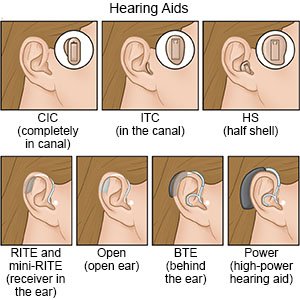How to Choose A Hearing Aid
Medically reviewed by Drugs.com. Last updated on Apr 6, 2025.
What is a hearing aid?
A hearing aid is a small electronic device placed behind or in your ear to help you hear better. It contains a microphone, an amplifier, and a speaker. You may need a hearing aid for each ear.
How do I choose a hearing aid?
Your healthcare provider will help you choose the right hearing aid for your needs. The type that is best for you may depend on the type of hearing loss you have.
- Choose the right size. Hearing aids come in many different sizes. Choose a hearing aid that you can handle well and that fits your ear comfortably.
- Choose the right fit. You may need a hearing aid that rests behind your ear. It is connected by a tube to a molded plastic piece that fits inside your ear. This hearing aid has larger controls and dials. A hearing aid may fit just inside your ear or in your ear canal. Ask which hearing aid is best for you.

- Ask about feedback. Feedback is a whistling sound that comes out of the ear mold when it does not fit properly. Feedback makes hearing difficult. Some hearing aids cause more feedback than others. You may need to try several types to find what works best for you.
How do I care for my hearing aid?
- Learn how to use the features , such as the volume, power, and other settings. Ask your healthcare provider how the hearing aid should be cleaned and maintained.
- Change the batteries as needed. Batteries may need to be changed every 1 to 2 weeks.
What else can I do to hear better?
- Give yourself time to get used to your hearing aid. It can take 3 months or longer to get used to the hearing aid.
- Ask people to face you directly when they speak to you. When you are in a group setting, sit in a location where you can clearly see the faces of the people who are talking.
- Help decrease feedback. Lower the volume of your hearing aid. Remove objects that are close to your ear, such as clothing. Earwax, dirt, or an ear infection can make feedback worse.
- Keep all appointments. You may need your hearing aid adjusted or your hearing checked for any changes.
- Learn about other listening devices. An assistive listening device (ALD) may be used with hearing aids to help you hear better. Ask your healthcare provider for more information about ALDs.
When should I call my doctor or audiologist?
- You still have problems hearing even when you use your hearing aids.
- You have questions or concerns about your condition or care.
Care Agreement
You have the right to help plan your care. Learn about your health condition and how it may be treated. Discuss treatment options with your healthcare providers to decide what care you want to receive. You always have the right to refuse treatment. The above information is an educational aid only. It is not intended as medical advice for individual conditions or treatments. Talk to your doctor, nurse or pharmacist before following any medical regimen to see if it is safe and effective for you.© Copyright Merative 2025 Information is for End User's use only and may not be sold, redistributed or otherwise used for commercial purposes.
Further information
Always consult your healthcare provider to ensure the information displayed on this page applies to your personal circumstances.
